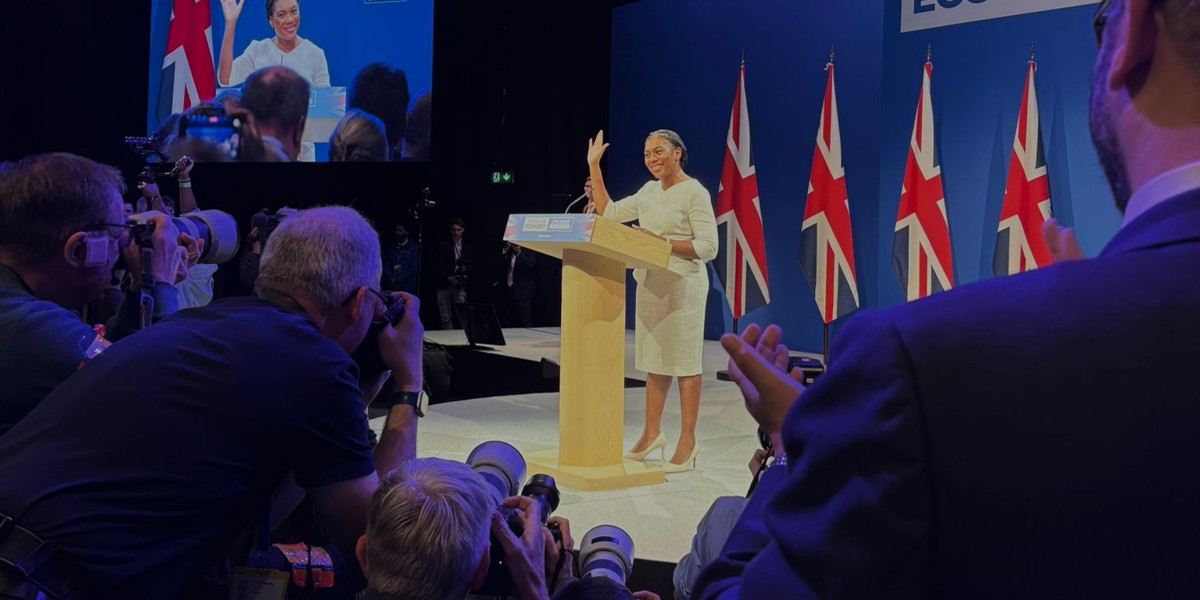
Is there a path back for the Tories?

By: Antony Morrison – Associate Partner at Walk Through Walls
Do policies matter?
Over the past year, Tory leader Kemi Badenoch has come under fire from some quarters over a lack of eye-catching announcements – leaving the field clear for Reform to make all the headlines.
Nobody could level that charge now.
Abolish stamp duty. Leave the European Convention on Human Rights. Give first-time buyers £5,000 towards a deposit. Repeal the Climate Change Act. Rein-back on net zero. Cut spending by £47 billion. Take control over prison sentences. Deport 750,000 illegal migrants.
At their Conference in Manchester, the Conservatives presented voters with a full British Tapas of policies to pick from.
The question is, are voters listening? And will this blizzard of announcements make any difference?
Context and credibility
On one level, of course policies matter. They tell us about a party’s priorities and values. How they would put principles into practice. The decisions that affect our daily lives.
Without a broad set of policies, a political party is little more than a pressure group. And of course a party wants to have policies that appeal to its target voters and can be sold on the doorstep.
But politically, policies only matter if anyone is listening. And that hinges on credibility, context and timing.
When ahead in the polls, a party brimming with ideas projects energy and vitality. When lagging in the polls, a retail policy blitz risks giving a whiff of desperation.
This is where the Conservatives face their biggest difficulty.
Permission to be heard
After last year’s historic election defeat, the challenge – and frustration – for Conservatives is to get a hearing from the electorate.
Before the public take any notice of policies, a party has to gain ‘permission to be heard’.
In 2005, after the Conservatives’ third defeat to Tony Blair, polling showed that when voters were presented with a list of anonymised party policies, many Conservative policies gained broad support. But as soon as voters were told that these were Conservative ideas, their popularity dropped. The brand tainted the policies.
The Conservatives confront a similar problem now.
And faced with an existential battle for the Right – and a drip of defections to Reform – the Conservatives are in an even more difficult position than twenty years ago.
So what, if anything, can be done? And did their Conference show the party making any headway?
From mea culpa to the economy
It’s said that time’s the greatest healer. Even in politics, this can be true – up to a point.
But to earn a proper hearing from voters, a party ejected from office has to show it is listening and changing. And this can’t be done overnight.
Polling by More in Common shows 71% of voters wanting Kemi Badenoch to apologise for the last Conservative Government’s mistakes.
Yet it takes more than a single speech or occasional acknowledgement to cut through to the public.
Regaining trust requires a concerted, relentless effort to show the party understands why it lost – with humility for past mistakes and an understanding of what the party got wrong. A mea culpa for letting people down, balanced with a few carefully chosen points that remind voters what the party can get right. Consistently reinforced throughout interviews, listening tours, social media – and accepting this means taking some brickbats from voters in the process.
Unfortunately for Kemi Badenoch, with Reform ahead in the polls, and Nigel Farage frequently making the political weather, time is a luxury the Tories can ill afford.
But there is a glimmer of hope for the Conservatives.
More in Common’s polling also shows that the Conservatives retain a residual reputation for economic competence, leading both Labour and Reform on the issue.
It is this which gives the Conservatives a starting point from which to rebuild – if it can move the debate onto the economy and gain that ‘permission to be heard’.
Building a new electoral coalition
Respected pollster James Johnson has stated there is currently no fruitful ‘liberal centre’ electoral coalition available to the Conservatives.
Yet there also appears to be a dawning realisation that the Conservatives can’t simply try to ‘out Reform Reform’.
That means having robust policies to address voters’ concerns over immigration are a necessity, but not enough.
There’s little chance the Conservatives will convince voters they would be more robust on immigration than Nigel Farage. Their best hope is to reinforce that they would be tougher than Labour, and to reduce the issue gap with Reform.
So as first steps towards rebuilding, the Party needs to concentrate on three things:
- Demonstrating that the Party has genuinely listened and changed – atoning for mistakes and taking concrete steps to show that these will never be repeated.
- Identifying a few key achievements from government that demonstrate that at its best it can be the party of growth and competence – and avoid conceding that nothing good was done in 14 years.
- Focusing greater attention on its strongest issue of the economy, jobs and taxes – whilst reassuring voters of a more robust approach to immigration if returned to government.
Beyond this, the party has a big job to do in rebuilding its organisation, restating its values, explaining how they reflect voters’ concerns, re-establishing links with business and increasing its donor base. But without first regaining a hearing, these challenges will be even harder.
A long road ahead
The Conservative Conference did show that the party understands the strategy needed – with ‘Stronger Economy; Stronger Borders’ as the slogan and policy announcements geared towards these issues.
The difficulty is getting voters to care – and to believe they can be delivered.
It requires deftness of leadership to convey a message that combines both humility for the past and a vision for the future, as well as an ability to hustle for media and public attention.
When it comes to policy, the Conservatives needed some eye-catching announcements to differentiate themselves from Reform, move the debate onto the economy, and put themselves back in the game. So there will be disappointment if the past week’s announcements fail to make any impact at all with voters.
But the risk is popular policies can become less than the sum of their parts – if when taken together voters deem them unbelievable.
So if the public are to sit up and start to take notice, there remains a long way to go in rebuilding trust and reconnecting with voters. And the time needed to achieve this may be a luxury the Conservative Party does not currently have.
Antony Morrison was Head of Campaign Communications at the Conservative Party from 2018-2024.



Walk Through Walls